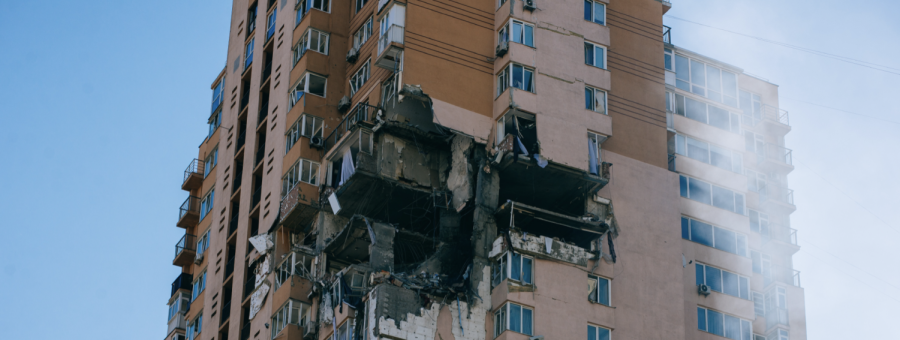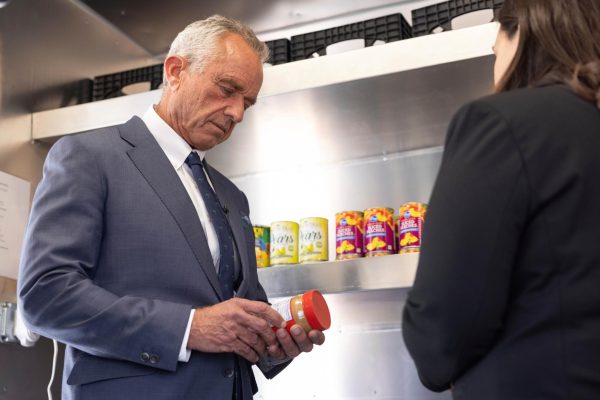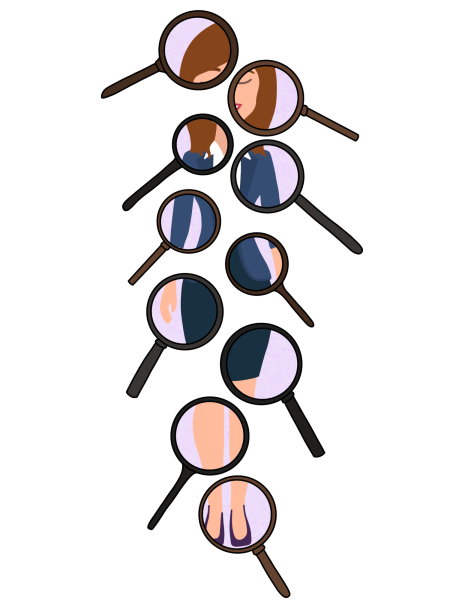Introducing Young Americans to Their Ukrainian Peers
Dear Colgate,
In the years since I last visited Ukraine I’ve missed it daily, but never so painfully as in these last few weeks. Still, I’m grateful to be here in these times. I have spent time in Ukraine for both research and personal reasons. I graduated from Colgate last May with a double major in international relations and Russian and Eurasian studies, and am now the Ciccone residential fellow. Ukrainians and Russians here have supported war resistance efforts, even as they worry for themselves and their loved ones. On campus, even those with no ties to Ukraine have been eager to help and voice support. One sentiment I’ve heard repeatedly is a humbled, “What would I do in their shoes?” Allow me to introduce my friends Anna and Liva, two young Ukrainian women who have given me permission to share their words. The following quotes were received via text and email. Anna’s were sent in English, while Liva’s are translated from Russian. Both women are multilingual.
Liva, from Kyiv, chose not to evacuate despite Russian assaults on the city. I asked how she decided to stay.
“On the first day of the war, we bought tickets for ourselves and our loved ones to evacuate,” she said. “The train was scheduled for three days after the war began. We approached our parents about leaving, but both my mother and my boyfriend’s parents flat-out refused to go.” Liva’s boyfriend initially wanted her to evacuate while he stayed with their parents, but Liva ended up volunteering throughout the Battle of Kyiv. She explained, “I felt that at the volunteer center I wouldn’t just be staying and sitting, but that I could help. Besides, Kyiv is my home and I really didn’t want to abandon it, abandon our parents, all the while taking a place from someone… who would have greater difficulty evacuating — mothers with children, old people, disabled people. And, when you’re busy doing things, you have the illusion that you are in control of the situation.”
Anna experienced the onset of war differently. Living abroad was a goal of hers which recently became a reality. She grew up in Odessa, and moved to Kyiv in 2017. Hired by a software development company, Anna spent half of 2021 working remotely from Columbia.
“The experience I won’t ever forget,” she said. “But I’ve always missed my family and friends in Ukraine, so I decided to stay closer this time. I chose Istanbul. I was enjoying my life to the fullest. … I absolutely love ferries and sunsets on the Bosphorus. I was looking for a tango school… Then, on the morning of the 24th of February, I woke up and my life stopped. It stopped to my friend’s message that Ukraine is [being] bombed. It stopped to the messages in my family chat asking if everyone is okay. If everyone was alive. If. … At the time I was joining protests in Istanbul … Of utmost importance for me was to be closer to my family. … Planes stopped flying to/from Odessa on day one. Being in Krakow provided me with the possibility to reach Lviv fastish. And then, somehow, Odessa. So I bought a one way ticket … Said goodbyes to friends in Istanbul and flew away.”
She has lived and volunteered in Poland since.
When asked how volunteering has been, Anna said, “like you have a looooooooot of friends.” Liva has described her volunteer organization as “like one big family.”
Anna has been helping distribute medicine and food.
“I can translate and answer questions for relocated people who don’t speak Polish or English. I even got to use Spanish once — two lovely women came in a car … with humanitarian aid all the way from Spain.” She also volunteers at a warehouse that shelters, feeds and clothes refugees. On April 20, she alluded to the familiar feeling of excitement upon a parcel’s arrival. “Got a delivery earlier today. Tourniquets. When I got them I realized that in my whole life I’ve never been happier to get my order delivered.” Her introduction to volunteering was a shock. “When I came to the main railroad station in Krakow to get information about volunteering activities, I wanted to cry… [In] my whole life I wouldn’t be able to imagine the level of catastrophe, without coming there. It was full of people. Of Ukrainians who were forced to leave their whole life behind. … With kids of different ages, with pets ranging from a bird to a dog… I have never in my life seen such a crowded railroad and so many totally lost people. I have never witnessed so much pain. And hope. Hope that their kids will have a night without air raids, that they won’t live in a bomb shelter any more. I saw care. Care from volunteers, care about each other, care in sharing food with a pet.”
Liva said she began volunteering practically by accident.
“On one of those first days when it seemed like the Russians would soon be in the city, my boyfriend and I went out to collect bottles for Molotov cocktails. A car stopped next to us, with a husband and wife inside, and they offered to help us with the cocktails … from them we learned about the Starlife Volunteer Center. Starlife sold insurance before the war, but when everything began they turned their offices into volunteer centers … Meeting rooms turned into blocks with different humanitarian aid: Food, clothing, hygiene, medicine, technical equipment. My job, with other employees of our unit, was to sort hygiene by type (gels with gels, soap with soap, etc.) and then to put together shipments. … [They] could come to us and say: we need wet wipes and toothbrushes for a certain number of snipers in the city center — and we would put it all together and hand it over for delivery… Despite all of the horrors happening nearby, everybody stayed calm … There was a lot of work and no time for fear. I’m happy that I was there and got the opportunity to help our soldiers defend the country, at least in this way.”
After the Russian retreat from Kyiv, headquarters followed the frontline. Liva remains in Kyiv.
Preparing for the long term, Anna and Liva have, for now, created routine. Anna wrote, “I don’t volunteer everyday now. Few times per week. Whenever it’s possible. I keep on supporting various places financially, as well.” She learned to shoot, considered joining Odessa’s territorial defense, but decided against it. “I’ve decided to do what I’m good at … and provide Ukraine with the resources I can,” she wrote. “[There’s] a work call I need to join. … That’s one of the reasons to keep going. I have to work for the Ukrainian economy. I have to keep going to support my family and friends.”
About the physical and emotional tolls of the war, Anna wrote, “I’ve cried for three days almost non-stop when the war came to my home. I almost didn’t eat for a week. Or two. And then did simply because I had to … I simply put in the work needed for me to go home. Someday. For every Ukrainian to finally go home.” She reminded me that people in occupied territories have suffered far worse. “I keep hope alive that one day we’ll bring home from all Russian concentration camps all the people from Mariupol. I still hope for people in Mariupol to get real green corridors. Not the ones Russians were shooting at … ” Anna has plenty of fears, and she’s angry. She worries about nuclear war. As the war goes on, she said, “after Bucha, Mariupol, Irpin, and devastatingly many others, we see it’s not a war. It’s a genocide.” She worries about her family, some of whom seek refuge abroad, most of whom face military violence in Odessa. Asked about her family, she responded, “There is no ‘fine’ anymore. There’s ‘we are still alive after another day of shelling.’” She praised those who have taken in displaced people, and wrote, “I have no words for the heroism of people back at home. They inspire me everyday. Our President who decided to stay with his people. Farmers who work in bulletproof vests on the fields [where the Russian military has left mines]. They work because the world needs to have food … A woman in a ruined village is providing for 20+ dogs and cats while barely having enough for herself… So many bright moments in that total darkness.” On my birthday, she texted me saying she hoped I could celebrate my next in Lviv. I hope so, too.
Liva, one of those “people back at home,” maintains a stoic outlook and her sense of humor. In a March 7 Facebook post, she shared her “Checklist Since the Beginning of the War.” She has checked off everything from watching rockets strike a neighboring town to running from a “damn close” projectile; hearing Russian armored personnel carriers nearby taking fire to learning how to sort shampoo and shower gel in “all of the languages of the world.”
Not everything has been overturned by the war; Liva married her longtime boyfriend, Sasha, during the Battle of Kyiv.
“My wedding was the most unique in the world,” she wrote. “We had been planning to make it official for quite a while, but never found the right moment. Well, now the right moment has been found. In times of war, marriage registration takes place according to a simplified procedure, in a single day, with no waiting period … I asked the humanitarian aid clothing department for a white T-shirt for Sasha, bought a white second-hand dress for $15 on the Internet, and we took a taxi and went to the Registry Office. The Registry Office in Ukraine registers not only marriages, but births and deaths too. The main entrance was closed, and everyone was admitted through the back entrance, an iron door like the one for a transformer booth. When we arrived, a woman all in black stood in line right behind us and asked to be allowed ahead as she needed to register the death of a loved one. Because of this, a registry office employee came out of the door and started to loudly call out, ‘Who’s Death for? Who wanted Death?’ And everyone in the line started laughing, even the lady in black. Still in our coats, we were asked to sign some log in the hallway and after that they said we were husband and wife. We didn’t even have time to put on the rings! This is how it happens when the country is at war. But we were still very happy.”
Liva, a film director, and Sasha, a photographer, lost their jobs due to the war. When asked if there was any place for art in the war, Liva responded, “In the first days there was absolutely no time for creativity, it was very scary and I had no desire or morale to start some kind of creative project … Thoughts were not about that at all. Sasha, being a photographer, wanted to shoot something, but he couldn’t do it without permission from the military … since Russians would use such photographs to calibrate their aim.” After the battle, Liva says they are resting, volunteering occasionally and seeking work.
I hope this has helped answer the question of what you would be doing in their shoes — probably your best to survive, however you could, along with your loved ones and neighbors. I know this because you are so like my dear Ukrainian friends, with whom I hope to once again walk on the beach and enjoy music, but who are, for now, doing what they must. The remaining question is one only you can answer: What are you doing today, in your own shoes?
Sincerely,
Dvorah Southland, Colgate Class of 2021






Christine • Apr 30, 2022 at 9:16 pm
A very personal article at this time when many Americans are “bored “ by the war and have blocked it out. Thank you.